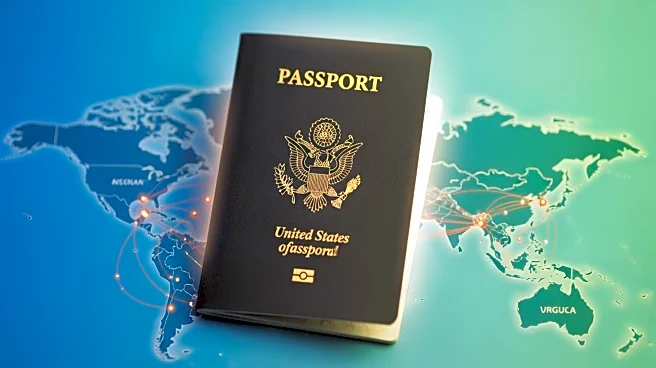What's Happening?
The United States passport has experienced a significant decline in its global ranking, falling to 12th place in the Henley Passport Index 2025. This marks the first time in 20 years that the US passport has dropped
out of the top 10. Previously ranked first in 2014, the US passport now offers visa-free or visa-on-arrival access to 180 countries and territories. The decline is attributed to recent changes in international visa policies, including Brazil's termination of its visa-free policy for US nationals and restrictions from several Asian countries. Meanwhile, Asian nations like Singapore, South Korea, and Japan have seen their passports rise in power, showcasing the evolving landscape of global mobility and the increasing influence of Asia in travel diplomacy.
Why It's Important?
The drop in the US passport's ranking highlights shifting dynamics in global travel and visa policies. This change could impact American travelers, who may face increased requirements for visas and pre-approvals for destinations that were previously accessible without such documentation. The rise of Asian passports, particularly those of Singapore, South Korea, and Japan, underscores the growing diplomatic influence and economic partnerships of these countries. This shift may affect international business, tourism, and educational exchanges, as countries with stronger passports enjoy greater mobility and access to global opportunities.
What's Next?
For US travelers, the decline in passport power may necessitate adjustments in travel planning, including securing visas for destinations that were previously accessible without them. The US government may need to engage in diplomatic efforts to negotiate visa-free agreements or improve bilateral relations to enhance travel freedom for its citizens. Additionally, the growing influence of Asian passports could lead to increased competition in global diplomacy and travel, prompting other nations to reassess their visa policies and international relations strategies.
Beyond the Headlines
The shift in passport rankings reflects broader geopolitical changes, including the rise of Asia as a significant player in global diplomacy and travel. This development may influence cultural exchanges and international collaborations, as countries with stronger passports can facilitate easier movement of people and ideas. The decline of the US passport also raises questions about the impact of domestic and foreign policies on global perceptions and travel freedom.










